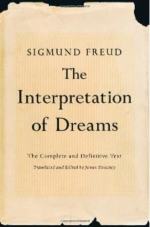|
This section contains 1,361 words (approx. 4 pages at 400 words per page) |

|
Chapter 7, Part 2 Summary
As the subtitle to the last part of Interpretations of Dreams suggests, Freud covers the waking caused by dreams, a final discussion of anxiety dreams, and a general discussion of the function of dreams. Following the dream process, he determines that a scene or wish/fantasy in the unconscious progresses toward the pre-conscious, which struggles through the censors to be perceived. All dream activity, he says, takes place during the waking-up stage of sleep. The waking-up stage takes time, he writes, and in that time the dream occurs.
The unconscious and pre-conscious perform many functions, such as thinking ahead, making resolutions, and finding solutions. These functions work throughout the day, and are continued into the night during sleep as what Freud calls "day residues." Day residues make up the bulk of the dream. With the unconscious excitation process, it can go...
(read more from the Chapter 7, Part 2 Summary)
|
This section contains 1,361 words (approx. 4 pages at 400 words per page) |

|




